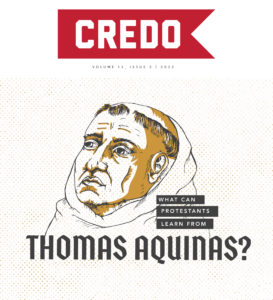So, you want to read Thomas Aquinas. Perhaps your experience is like that of many other good-hearted and well-intentioned students. You acquired a copy of the Summa (translators unknown), cracked open a volume that appealed to you, and were immediately met with insurmountable terms such as substance and accident, form and matter, or esse and essentia. You may have even concluded that reading Thomas is simply impossible and Thomists must be pretending to understand Thomas in order to avoid embarrassment (a claim not without some measure of truth)! Indeed, for twenty-first century protestants, reading Thomas is like traveling to a foreign country, but take heart. There are many worthy guides to help you navigate the terrain of the greatest medieval scholastic. Below are ten recommended resources to help you better understand “the happy teacher.”
Beginner:
A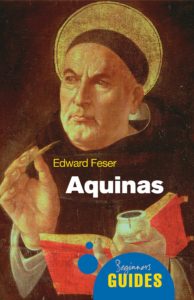 quinas by Edward Feser
quinas by Edward Feser
Feser’s aptly named Aquinas: A Beginner’s Guide is an accessible one-stop-shop for all the major concepts that you’ll need to recognize in order to read Thomas’s work. Feser masterfully presents content in an understandable way without compromising the depth of the subject matter. If you only have time to read one secondary source about Thomas, then this is my recommendation. If you only have time to read a single chapter about Thomistic concepts before diving into the primary sources, then chapter 2 of this work is a good choice.
T homas Aquinas: An Evangelical Appraisal by Norman Geisler
homas Aquinas: An Evangelical Appraisal by Norman Geisler
Norman Geisler is on the short list of most famous protestant Thomists in the twentieth century, and he is unafraid to accept that title in this work. Writing as an evangelical protestant, Geisler demonstrates how protestant theology can benefit from increased familiarity with Thomas. If you are nervous about engaging one of the chief theologians of the Catholic church, then Geisler may help you recognize some familiar territory in Thomas’s work. There is a reason that Thomas was called “the common doctor,” after all. Additionally, Geisler’s work includes the best Aquinas pun I’ve read thus far (“Should ole Aquinas be forgot and never brought to mind?”).
A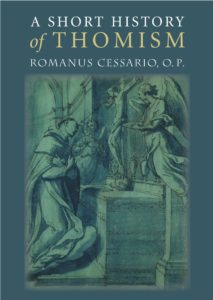 Short History of Thomism by Romanus Cessario, O.P.
Short History of Thomism by Romanus Cessario, O.P.
The school of thought that promotes Thomas’s theological and philosophical conclusions is known as Thomism but defining the boundaries of this movement is notoriously difficult. Romanus takes roughly 700 years of conceptual development and condenses the main points of emphasis into an enjoyable 96 pages. As this work demonstrates, the tremendous influence of Thomas on the scholars that followed him is undeniable.
T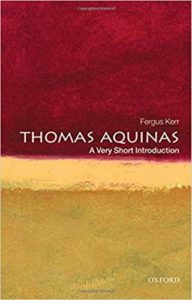 homas Aquinas: A Very Short Introduction by Fergus Kerr
homas Aquinas: A Very Short Introduction by Fergus Kerr
While the other books on this list have focused more on various Thomistic concepts, this work focuses on the life and writings of Thomas. If a student has virtually no familiarity with Thomas, then this would be a good starting point, and it is frequently listed as a recommended resource for beginners. It may not help you read Thomas’s work, but Kerr skillfully presents a bird’s eye view of the major events of Thomas’s life and summarizes his most essential works. It may very well be the least intimidating book on this list, as it can easily fit in your pocket and may be read in a single setting.
Intermediate:
T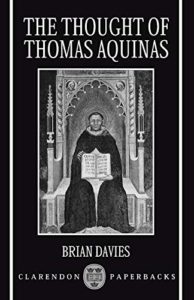 he Thought of Thomas Aquinas by Brian Davies
he Thought of Thomas Aquinas by Brian Davies
Following the outline of Thomas’s Summa, Brian Davies’s book is one of the most helpful summarizations of Thomas’s thought available (A summa of the Summa, if you will). This book is thorough, clocking in around 375 pages, while still maintaining accessibility. If you find yourself struggling with a specific article in the Summa, then there is a very good chance that Brian Davies’s explanation could prove beneficial. I find myself returning to this source frequently, probably more than any other book on this list.
T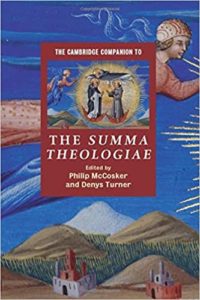 he Cambridge Companion to the Summa Theologiae edited by Philip McCosker and Denys Turner
he Cambridge Companion to the Summa Theologiae edited by Philip McCosker and Denys Turner
Thomas wrote more than just the Summa, and one cannot master his thought (if such a thing is possible) without working through his biblical commentaries, philosophical treatises, or other theological works. However, there is no denying that the Summa is his magnum-opus and the source that students most want to read. To that end, this Cambridge Companion is an invaluable asset. Divided into three sections, the first part is entirely dedicated to helping students read the Summa by explaining the layout, methodology, and format of the work. Section two provides a summary of doctrine (featuring another appearance by Brian Davies), and part three examines the influence of Thomas on theological camps outside of Catholicism. This is a collection of essays, so some chapters are more accessible than others, but students equipped with the basics of Thomistic metaphysics should be able to benefit from the work as a whole.
A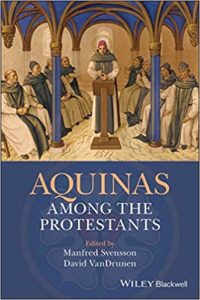 quinas Among the Protestants edited by Manfred Svensson and David VanDrunen
quinas Among the Protestants edited by Manfred Svensson and David VanDrunen
The discipline of systematic theology is abuzz right now with the concept of Theological Retrieval. Theologians are steadily releasing works on the importance of learning from the past, but could Thomas actually be a friend to protestants? The authors within Aquinas Among the Protestantstend to think so. This collection of essays outlines the historical influence of Thomas on the earliest protestants, addresses some of the popular critiques against Thomas within Protestantism, and suggests how protestants may move forward with Thomistic theological retrieval. Again, some chapters are more accessible than others, but any protestant nervous about the seeming rise of Thomism within their ranks (could we call them “doubting Thomists”?) may have their fears assuaged by this excellent work.
S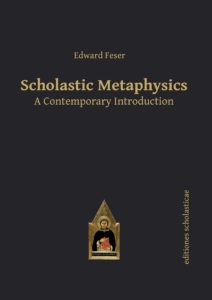 cholastic Metaphysics: A Contemporary Introduction by Edward Feser
cholastic Metaphysics: A Contemporary Introduction by Edward Feser
It may seem strange to include an “introduction” under the “intermediate” category of resources. Feser’s work is readable and can no doubt be approached by beginners. Be forewarned, though, the concepts of medieval scholasticism are going to be foreign for many modern and post-modern students. Still, if Feser’s overview of Thomistic metaphysics in Aquinas: A Beginner’s Guide piqued your interest, then this work is a goldmine. Additionally, this book is broad enough to not only improve your reading of Thomas but would also prepare you to read other medieval scholastics such as William of Ockham and John Duns Scotus. If you complete this book and still want more Thomistic metaphysics, then you could move on to John Wippel’s The Metaphysical Thought of Thomas Aquinas, but that book is not for the faint of heart.
Advanced:
P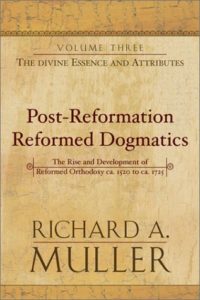 ost-Reformation Reformed Dogmatics by Richard A. Muller
ost-Reformation Reformed Dogmatics by Richard A. Muller
I must confess – making this recommendation feels like cheating. Muller’s work is not specifically on Thomas or Thomism, but he does, however, show the tremendous influence Thomas had on the Protestant Orthodox. This work is very difficult to acquire, but if you are interested in the relationship between Thomas and Protestantism, then you need to familiarize yourself with the name Richard A. Muller. Even if you cannot access PRRD, some of Muller’s other works handle Thomistic concepts at a very high level (see, for instance, Divine Will and Human Choice). That being said, understand that Muller is an expert writing to experts, so I would not recommend his work as a starting point for new students. Still, if you have the time and energy to dedicate to high-level research, then you will not be disappointed.
A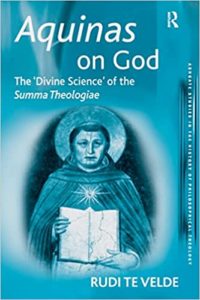 quinas on God: The ‘Divine Science’ of the Summa Theologiae by Rudi Te Velde
quinas on God: The ‘Divine Science’ of the Summa Theologiae by Rudi Te Velde
Rudi Te Velde’s Aquinas on God is the most difficult book on this list, but if you want to take a deep dive into the most important Thomistic contribution to doctrine, then this resource is required reading. Te Velde clearly, though technically, explains concepts that are frequently misunderstood such as the division of being into act and potency, the distinction of essence and existence within Thomas’s doctrine of God, and “negative theology”. Additionally, Te Velde does an excellent job discussing the Thomistic concepts of creation and happiness (a topic protestants need to discuss more), and this book contains one of the best technical explanations of analogical predication that I’ve encountered thus far. Students can understand Thomas’s doctrine of God without reading Te Velde’s work, but Te Velde helps his students appreciate the depth and technical expertise present in Thomas’s argumentation from the very beginning. Reading Thomas after reading Te Velde is a bit like “reading in color.”
Bonus:
Simon Tugwell’s Biography of Thomas in A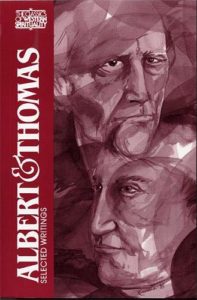 lbert and Thomas: Selected Writings
lbert and Thomas: Selected Writings
While some of the other works on this list include a brief chapter on the life of Thomas, none of them would be characterized as a biography with the possible exception of Kerr’s book. If you are interested in learning more about Thomas’s historical context, then I suggest Simon Tugwell’s biography of Thomas within his edited work, Albert and Thomas: Selected Writings. It is, once again, only one chapter of the book, but Tugwell does an excellent job in grounding his work in primary sources and balancing the mundane and supernatural aspects of Thomas’s life. Furthermore, I appreciated Tugwell’s explanation of the end of Thomas’s life more than any of the other biographies I have read. Tugwell is frequently cited in the pertinent literature (for good reason), and students will walk away with a strong understanding of Thomas’s life after working through this book.
There you have it. If you are interested in starting your journey through Thomas’s writings, then I wholeheartedly believe that there is at least one book on this list that will help you take the first step, regardless of your prior experience with the angelic doctor. Tolle lege!

